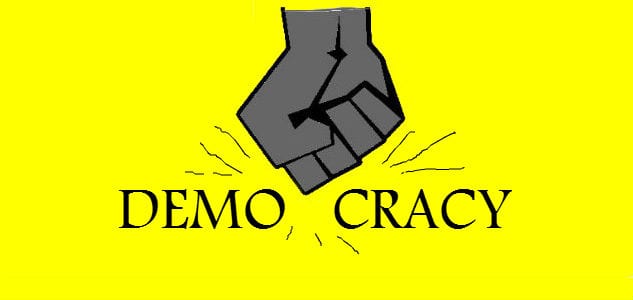Freedom. Rights. Equality. Democracy. Rule of Law. Free Enterprise. These are the tenets of liberal democracy (the word “liberal” referring not to left-leaning progressivism but to the Latin word for “freedom”). Most Americans across the political spectrum take these principles for granted. But today liberal democracy is being attacked from both the left and the right.
Despite the alleged polarization of our politics, some conservatives and some liberals are agreeing with each other that our constitutional liberties and system of government (and their equivalent in other parts of the world) are to blame. But, of course, they criticize it for different reasons.
To generalize, the Left is currently frustrated with such constitutional rights as religious liberty, the right to keep and bear arms, and freedom of speech, believing that they give the individual too much latitude and prevent the government from taking collective action to ensure justice for all, including preventing discrimination. Politically, the Left would like to change the Supreme Court, the Electoral College, and tenets of democratic federalism that helped elect Donald Trump. Liberal democracy empowers individuals at the expense of groups and makes for smaller, weaker governments that cannot take effective action against social injustice.
But the Left’s problems with liberal democracy go deeper. Accompanying personal and political freedom is economic freedom, a.k.a., “capitalism,” which has enabled some individuals to become extremely wealthy and politically influential. This is held to contradict the democratic principle of equality and to allow the wealthy and members of other privileged groups to exercise power over workers, minorities, women, the poor, and other “marginalized” groups.
Continuing the generalizations, the Right believes that the freedom made possible by liberal democracy undermines the family, destroys communities, and weakens the church and other moral authorities. This side, like the Left, also criticizes free market economics for pursuing profit over the needs of local communities and replacing national interests with economic “globalism.”
We have blogged about the religious rejection of liberal democracy in the Catholic movement known as integralism, but some political conservatives are also raising doubts about some traditional American principles, suggesting that democracy is too individualistic to promote the “common good.”
The left-leaning online magazine Vox gives the reasoning from both sides. Read Zack Beauchamp, The anti-liberal moment, with the deck “Critics on the left and right are waging war on liberalism. And liberals don’t seem to have a good defense.” Here are some excerpts:
[From the Left]
Liberalism’s core error, in this view, comes from a mistake in its vision of democracy. Liberals support democracy as a matter of principle, believing that individuals have a right to shape decisions that affect their lives in deep and important ways. But liberals curiously excludes parts of economic life from this zone of collective self-determination, seeing the market as a place where people have individual but not collective rights. Liberalism sees nothing wrong with the heads of Amazon and Facebook making decisions that have implications for the entire economy.
So long as capitalists are free from democratic constraint, leftists argue, liberal democracy is on dangerous footing. The super-rich use the power their accumulated wealth provides to influence political life, rearranging policy to protect and expand their fortunes. The rise of neoliberalism is, per the socialist writer Peter Frase, this process in action: proof that capitalism will invariably corrupt liberalism’s promise of freedom and equality.
[From the Right]
The right’s attack on liberalism is even more sweeping than the left’s.
Conservative anti-liberals question not only freedom in the economic sphere, but the value of pluralistic democracy itself — arguing that core liberal ideals about tolerance and equality actually produce an insidious form of tyranny that destroys communities and deadens the human spirit. . . .
Liberalism’s foundational premise is that the government must defend liberty: that people should be free to choose their paths in life, and that the state’s role should first and foremost be protecting and enabling the exercise of this freedom. Conservative critics believe this basic liberal picture is rooted in a false, impoverished view of human life — there is not, and never has been, such a thing as freely choosing, autonomous individuals.
Actual people are embedded inside social relations and identities — most notably, family, faith, and community — without which they lack meaning and purpose. Liberalism elevates the will of the individual at the expense of these pre-political bonds. . . .
“For decades now our politics and culture have been dominated by a particular philosophy of freedom,” [Missouri Senator Josh] Hawley writes in an essay published by Christianity Today. “It is a philosophy of liberation from family and tradition, of escape from God and community, a philosophy of self-creation and unrestricted, unfettered free choice.”
The pursuit of profit erodes social ties, creating incentives for people to pursue their self-interest rather than build families or embed themselves in communities. Young people leave their small towns in search of career and meaning in anonymous big cities, destroying the communal ethos that allowed people to feel happy and secure. Rising inequality chips away at the bonds of social solidarity, hollowing out the middle class and placing deep barriers between citizens. . . .
“The political project of liberalism is shaping us into…increasingly separate, autonomous, non-relational selves replete with rights and defined by our liberty, but insecure, powerless, afraid, and alone,” [Notre Dame political theorist Patrick] Deneen, probably the sharpest of these conservative anti-liberals, writes in his book Why Liberalism Failed.
What do you think about all of this? Have you, for reasons either of the Right or the Left, given up on freedom and democracy? If not, how would you defend these principles against their critics? If so, what alternatives to our current constitutional order do you envision?
Illustration: “Democracy Chronicles,” Public Domain via Flickr.













